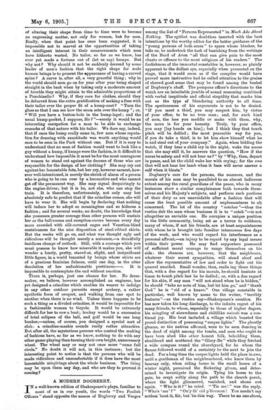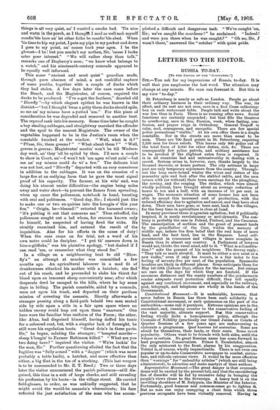A MODERN DOGBERRY.
IN a well-known edition of Shakespeare's plays, familiar to 1 most of ns in our youth, the words " Two Foolish Officers" stand opposite the names of Dogberry and Verges among the list of "Persons Represented " in Much Ado About Nothing. The epithet was doubtless inserted with the best intentions by the worthy editor for the better guidance of the "young persons of both sexes " to spare whose blushes, he tells us, he undertook the task of banishing from the writings of the Bard of Avon " all that can give pain to the most chaste or offence to the most religious of his readers." The foolishness of the immortal constables is, however, so plainly apparent to the dullest eye, especially when presented on the stage, that it would seem as if the compiler would have proved more instructive had he called attention to the grains of shrewd good sense that may be found among the bushel of Dogberry's chaff. The pompous officer's directions to the watch are an inimitable jumble of sound reasoning combined with verbal ineptitude and official stupidity that marks him out as the type of blundering authority to all time. The speciousness of his arguments is not to be denied. "If you meet a thief, you may suspect him, by virtue of your office, to be no true man ; and, for such kind of men, the less you meddle or make with them, why, the more is for your honesty. Truly, by your office, you may [lay hands on him] ; but I think they that touch pitch will be defiled ; the most peaceable way for you, if you do take a thief, is to let him show himself what he is and steal out of your company." Again, when bidding the watch, if they hear a child cry in the night, wake the nurse that she may still it, he answers the question, " How if the nurse be asleep and will not hear us ? " by "Why, then, depart in peace, and let the child wake her with crying ; for the ewe that will not hear her lamb when it baes will never answer a calf when it bleats."
Dogberry's care for the persons, the manners, and the morals of his men may be paralleled to an almost ludicrous extent among the rural guardians of the peace, who in many instances show a similar complaisance both towards them- selves and his Majesty's subjects, and perform such portions of their duty as are unavoidable after a fashion that will cause the least possible amount of unpleasantness to all concerned. The lot of the country " cotcher "—thus the rustics dub the man whose business it is to " cotch "—is not altogether an enviable one. He occupies a unique position in the little community, being set as a terror to evildoers, many of whom, if not his friends, are at least acquaintances with whom he is brought into familiar intercourse five days of the week, and who would regard his interference as a personal affront,—an injury to be repaid by any legal means within their power. He may find supporters possessed of sufficient moral courage to range themselves on his side : the chances are, however, that the neighbours, whatever their secret sympathies, will stand aloof and allow the representative of law and order to fight out his quarrel unaided. Small wonder, then, realis ing these things that, with a due regard for his morals, he should hesitate at times to touch pitch lest he be defiled ; or, with a due regard for his skin, if any man " will not stand when he is bidden," he should " take no note of him, but let him go," and " thank God " he is " rid of a knave." One village constable in particular, well known by name to the writer, " terribly features "—as the rustics say—Shakespeare's creation. He has now taken his long discharge, to the infinite regret of his many friends, to whom, especially to those of higher degree, his mingling of shrewdness and childlike naivete was a con- tinual joy. His beat included a village which boasted the proud distinction of possessing "corpse lights." The ghostly gleams, so the natives affirmed, were to be seen dancing in the dead of night among the tombs, and men who ought to have been abed like other honest folk, beholding them, shuddered and muttered the " Glory-Be " while they fetched a wide compass round the churchyard, for he whom the flames followed would of a certainty be the next to join the dead. For a long time the corpse lights held the place in awe, until a gentleman of the neighbourhood, who knew them by hearsay only, when riding home in the small hours of a winter night, perceived the flickering gleam, and deter- mined to investigate its origin. Tying his horse to the gate, he crept softly along the path to the church porch, where the light glimmered, vanished, and shone out again. " Who is it P " he cried. "'Tis me ! " was the reply. " Who's ' me' ? " " On'y th' old pliceman ! You needn't say nothen 'bout it, Sir, but this way. There be no one about, things is all very quiet, an' I wanted a smoke bad. 'Tie nice and warm in the porch, so I thougift I med as well mek myself comfer'ble here an' let other folks be comfer'ble abed. When 'tie time to kip my point, I puts my pipe in my pockut and down I goes to my point, an' comes back year agen. I be the ghwost—I be ! but you needn't say nothen, Sir, 'cause I looks arter your interest." " We will rather sleep than talk," remarks one of Dogberry's men ; "we know what belongs to a watch," and his nineteenth-century comrade appeared to be equally well informed.
This same "ancient and most quiet" guardian made, through pure absence of mind, a not unskilful capture of some youths, together with a couple of ducks which they had stolen. A few days later the case came before the Bench, and the Magistrates, of course, required the ducks to be produced. "I've a-got the feathers," drawled old "Blowfly "-by which elegant epithet he was known in the district—".but I thought 'twas a pitty them ducks should spile, m so me an' my missus have a-yutted 'urn." For this piece of consideration be was degraded and removed to another beat. The reproof sank into his memory. Some time later he caught a boy stealing cabbages, and straightway marched the offender and the spoil to the nearest Magistrate. The owner of the vegetables happened to be in the Justice's room when the constable knocked at the window. " Well, what is it ?" "Prase, Sir, them greens? " " What about them ? " " Well, greens is greens ; Magistrates' meetin' won't be till Wednes-
day week, an' they be spiled by then. I'll save a couple to show in Coort, an'—I wun't tek 'um agen wi'out axin'—but me an' my missile could do wi' a few." The delicate hint was not lost, and " Blowfly " departed with an easy conscience in addition to the cabbages. It was on the occasion of a large fire at an outlying farm that he gave the most signal proof of his capacity. The farmer, at his wits' end, was doing his utmost under difficulties—the engine being miles away and water short—to prevent the flames from spreading, when up came the policeman, notebook in hand, bursting with zeal and politeness. " Good day, Sir; I should just like to make one or two en-quiries into the horagin o' this year fire." " Origin, be—blessed !" retorted the harassed owner; " it's putting it out that concerns me." Thus rebuffed, the policeman sought out a lad whom, for reasons known only to himself, he suspected of having fired the ricks. He straitly examined him, and entered the result of the inquisition. Alas for his efforts in the cause of duty ! When the case came on for trial, not a word of his own notes could he decipher. " I put th' answers down in hire-o-glifficks," was his plaintive apology, " but dashed if I can read 'urn, or remember what they stood for."
In a village on a neighbouring beat to old "Blow- fly's" an attempt at murder was committed a few months ago. An agricultural labourer in a mad fit of drunkenness attacked his mother with a hatchet; she fled out of his reach, and he proceeded to slake his thirst for blood upon an innocent sheep conveniently near, after which desperate deed he escaped to the hills, where he lay some days in hiding. The parish constable, aided by a comrade, were set upon his track, and departed on their perilous mission of arresting the assassin. Shortly afterwards a stranger passing along a field-path beheld two men seated side by side upon a stile in a fair open space where no bidden enemy could leap out upon them "unaware." One hero wore the familiar blue uniform of the Force ; the other, like Ahaz, had disguised himself, having doffed his tunic for a coloured coat, but, with a singular lack of foresight, he still wore his regulation boots. " Great doin's in these parts, Sir," he began, saluting the stranger; "'tempted murder— sheep b'longin' to Farmer Robinson killed." " What are you two doing here ? " inquired the visitor. " We're lookin' for
the man, Sir." Further questioning elicited the fact that the fugitive was "fully armed" with a "dagger" (which was more probably a table knife), a hatchet, and more effective than either, a big flint in the toe of a stocking. (This last weapon is to be commended to Mr. E. T. Reed.) Two or three days later the visitor encountered the parish policeman—still dis- guised, this time in a suit of large checks, and still revealing his profession by his boots—in the village street. He carried field-glasses, in order, as was unkindly suggested, that he might avoid the would-be assassin's whereabouts ; his face reflected the just satisfaction of the man who has accom-
plished a difficult and dangerous task. " We've caught 'un, Sir; we've caught the murderer!" he. exclaimed. "Indeed! and were you there when he was caught?" " Oh no, Sir, I wasn't there," answered the " cotcher " with quiet pride.











































 Previous page
Previous page